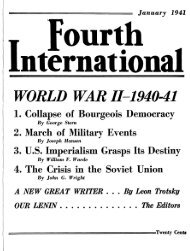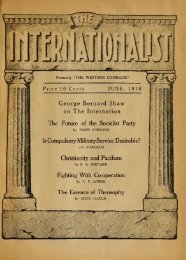The Stalin school of falsification - Marxists Internet Archive
The Stalin school of falsification - Marxists Internet Archive
The Stalin school of falsification - Marxists Internet Archive
You also want an ePaper? Increase the reach of your titles
YUMPU automatically turns print PDFs into web optimized ePapers that Google loves.
<strong>Stalin</strong> School <strong>of</strong> Falsification -- Introduction<br />
<strong>of</strong> the fate that still awaits Sokolnikov. Imprisoned are: Preobrazhensky, once a prominent <strong>of</strong>ficial <strong>of</strong> the<br />
government's financial administration; Arkus, once the assistant director <strong>of</strong> the State Bank; Tumanov,<br />
manager <strong>of</strong> the powerful Industrial Bank. Remember that they were imprisoned by Yagoda, who is<br />
himself now charged with embezzlement!<br />
One leader in agriculture after another -- either in the Right wing or the Left -- has fallen under the blows<br />
<strong>of</strong> the blind, frightened or vindictive bureaucracy. Shot last year was I. I. Reingold, once assistant<br />
Commissar <strong>of</strong> Agriculture, in the department <strong>of</strong> cotton raising; shot less than half a year later was Nikolai<br />
Muralov, once Deputy Commissar <strong>of</strong> Agriculture, himself an agronomist, one <strong>of</strong> the few old Bolsheviks<br />
who, like Rykov and Shliapnikov, participated directly and actively in the 1905 revolution. Imprisoned<br />
as scapegoats or for insufficient sycophancy to <strong>Stalin</strong> are: A. P. Smirnov, Commissar <strong>of</strong> Agriculture<br />
since July 1923; his successor, Teodorovich, who once headed the Peasants' International; and Eismont,<br />
vice-Commissar <strong>of</strong> Agriculture for Food Sup plies in Russia in 1932 when he was arrested together with<br />
Tolmachev and scores <strong>of</strong> other high <strong>of</strong>ficials.<br />
Even worse is the devastation in the military field, where so many tried revolutionists have been replaced<br />
by braided Marshals and lesser martinets. Gone is Trotsky, organizer and leader <strong>of</strong> the most remarkable<br />
army the world has ever seen, first chairman <strong>of</strong> the Supreme War Council. Gone is the Deputy<br />
Commissar <strong>of</strong> War and acting president <strong>of</strong> the Revolutionary Military Council in 1918, Efraim<br />
Sklyansky, Trotsky's right-hand man, a revolutionist with exceptional military talents, who was driven<br />
out <strong>of</strong> <strong>of</strong>fice by intrigues and machinations when Trotsky was forced to surrender his post as Commissar<br />
<strong>of</strong> War, and who undoubtedly escaped prison or the firing squad as an "agent <strong>of</strong> Hitler "only because he<br />
died in an accident in New York in 1925. Imprisoned now is Shtykhold, secretary to Sklyansky, and one<br />
<strong>of</strong> the earliest organizers <strong>of</strong> the Red Army. Imprisoned are the distinguished military men Gayevsky and<br />
Vladimir Smirnov-the latter dying, his sight gone, confined in Suzdal penitentiary. In prison, for the third<br />
time, is Gruenstein, Red Army organizer in the early days, divisional commander, a hard labor prisoner<br />
under the Czar, with countless years <strong>of</strong> Bolshevik party membership behind him. In prison are General<br />
Vitovt Putna, once military representative <strong>of</strong> the Soviets in Berlin, where he was the Red Army's link<br />
with the Reichswehr, and late military attache <strong>of</strong> the embassy in London; General Dmitri Schmidt, who<br />
was mentioned before; the military commanders Kuzmichev and Esterman. Shot in the January trial was<br />
N. I. Muralov, former high <strong>of</strong>ficial <strong>of</strong> the Military Inspection and for years the commandant <strong>of</strong> the<br />
Moscow Military District. Shot in the August trial was Sergei Mrachkovsky, who won the Urals from the<br />
Whites, and who was commandant <strong>of</strong> the Urals Military District until 1924. Held in prison is<br />
Klias-Klavin, Commissar <strong>of</strong> Defense <strong>of</strong> Petrograd during the Civil War, whom the government saved<br />
from death in December, 1922 when he was exchanged, with ninety other communists, for Latvian<br />
hostages held in Moscow. In prison now is Sokolnikov, once commander <strong>of</strong> the Eighth Army at the<br />
southern front. Shot in August as a "traitor "was I. N. Smirnov, commander <strong>of</strong> the famous Fifth Army<br />
which took Kazan. Another <strong>of</strong> the leaders <strong>of</strong> the Fifth Army in the struggle against Kochak was<br />
Man-Nevelson, now completing his ninth year in <strong>Stalin</strong>ist prison exile; among his "counter revolutionary<br />
crimes "is the fact that he is Trotsky's son in-law. In prison, without a trial (virtually all the Trotskyists<br />
were imprisoned without even a semblance <strong>of</strong> a trial), is I. T. Smilga, who, together with Tukhachevsky,<br />
led the Seventh Army against Pilsudski in 1921.<br />
Finally, in the field <strong>of</strong> foreign affairs, the change has been striking. Revolutionary Russia's first<br />
Commissar <strong>of</strong> Foreign Affairs was Trotsky. He was succeeded by Chicherin, who was finally replaced<br />
by Litvinov after a wretched intrigue which drove Chicherin to morose, brooding exile in the West. In<br />
addition to these two, virtually all <strong>of</strong> Russia's ablest revolutionary diplomats and foreign trade<br />
http://www.marxists.org/archive/trotsky/works/1937-st2/sf01.htm (9 <strong>of</strong> 11) [06/06/2002 15:05:49]

















